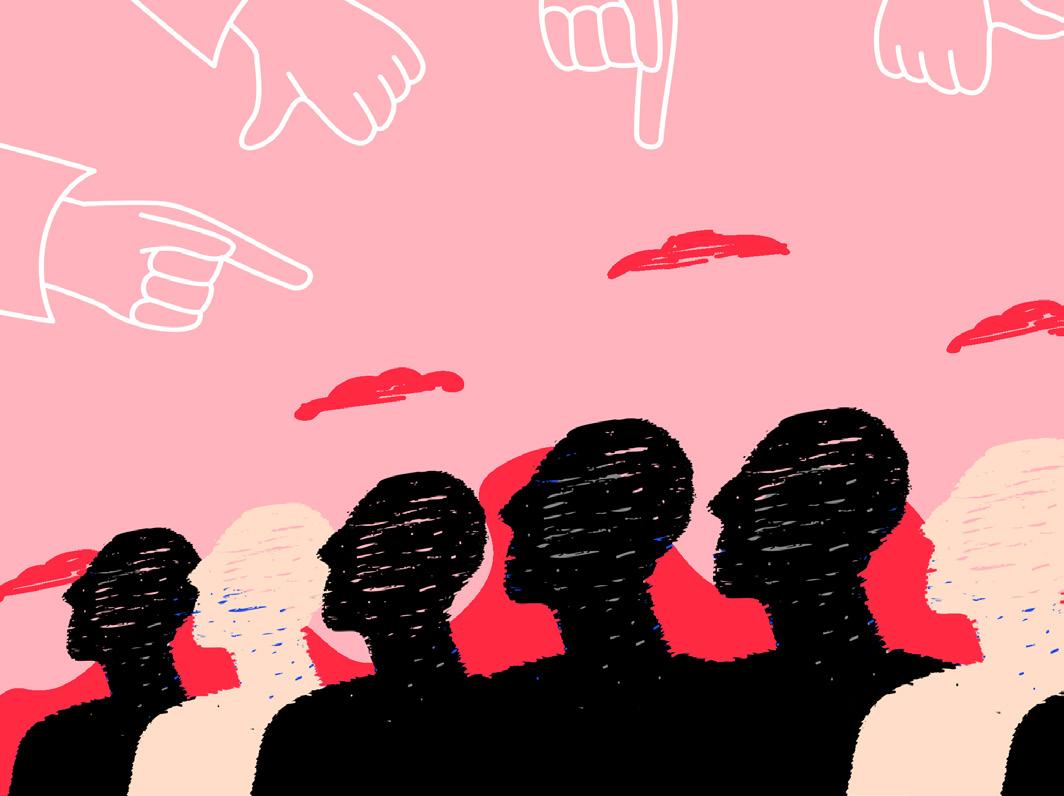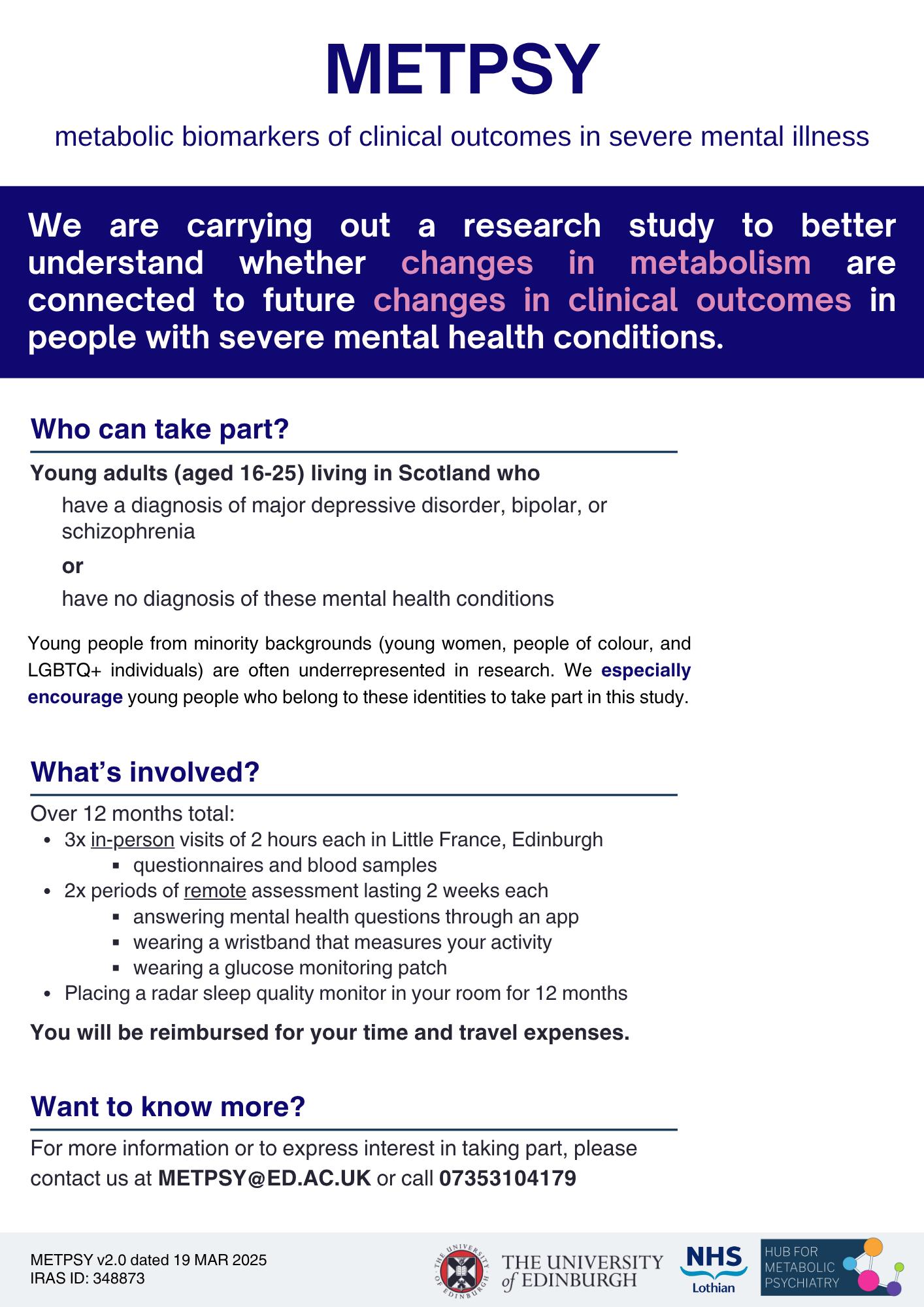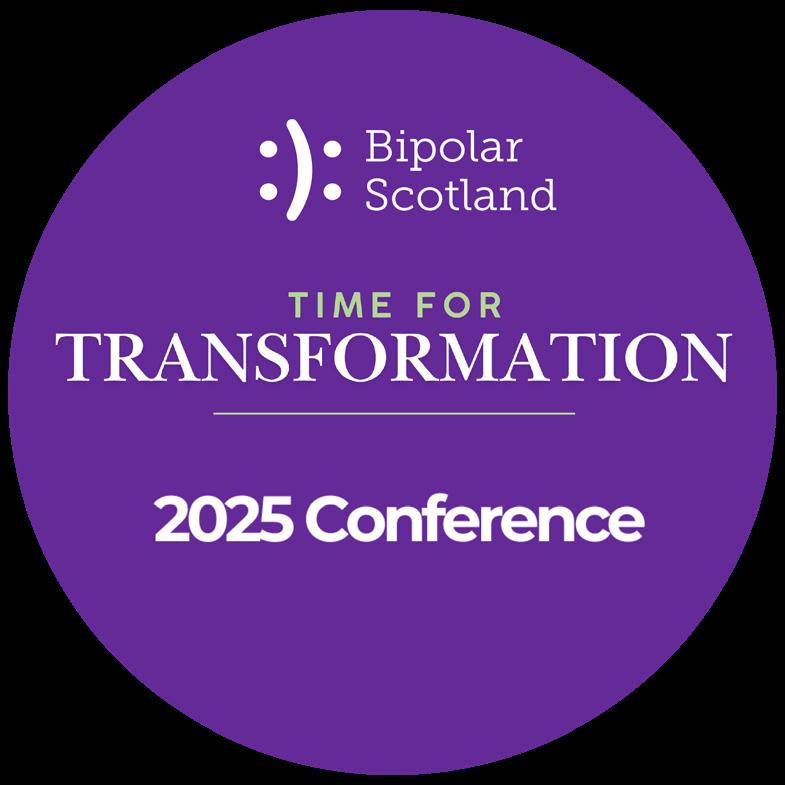






Welcome to the new issue of On The Level!
It’s been an incredibly busy few months for the team here at Bipolar Scotland and that’s definitely reflected in this summer issue – it’s absolutely jam-packed with the latest research, survey findings, and inspiring personal stories from our community!
We’re shining a spotlight on mental health inequalities, with a breakdown of our recent healthcare survey on P18. It’s a sobering but vital read, showing where improvements are urgently needed. Meanwhile, in Research Corner on P10, we take a deep dive into metabolic psychiatry – a growing field that explores the fascinating links between metabolism and mental health. This emerging research could reshape how we approach and treat conditions like bipolar.
Turn to P8 for our practical guide to travelling smart with bipolar – from finding the right insurance to managing jet lag – and don’t miss David Carr’s powerful reflection on the stigma of disclosure on

speakers and expert-led workshops over on P14.

Time For
This will be my last issue as editor, and I just want to say what a privilege it’s been to help shape and share On The Level. Thank you to the amazing team at Bipolar Scotland and to each and every one of you for sharing your stories, sending kind messages, or simply taking the time to read an issue. This community has been a constant source of strength, inspiration, and warmth. I’m so pleased to be leaving the magazine in the safe and talented hands of Pete Stanton, and I know it will continue to grow and thrive.
If you have something you’d like to share, email petes@bipolarscotland.org.uk with the subject line ‘On The Level’. The next edition will be out on Wednesday 24th September, and contributions are welcome by Monday 8th September.
Enjoy the issue!
Sian Dolan Editor

Travel Smart This Summer Essential tips for staying well on holiday – from insurance to jet lag.

Conference Countdown! Get to know the speakers and what to expect from the workshops.

Edited by Jamie Stewart and Sian Dolan
Please note that the views and opinions expressed in On The Level are not necessarily those of Bipolar Scotland.
Submissions: If you would like to submit a piece of writing, a photo or an idea to be considered for future issues of On The Level, please get in touch with Sian Dolan (editor@bipolarscotland.org.uk)
We would also love your feedback about On The Level. Send us an email or reach out to us on social media. You can find us on Instagram (@bipolar_scotland) and Facebook (@bipolarscotland) 12 8 14 18
©Bipolar Scotland 2025 Scottish Charity No. SC021705 Company No. 163305
T: 0141 560 2050 E: info@bipolarscotland.org.uk bipolarscotland.org.uk

The Stigma of Bipolar
David Carr’s powerful piece on stigma and disclosure.

Health Inequalities Survey
Discover what your responses revealed – and what needs to change.
Disclaimer: On The Level works in good faith with a range of subject-matter experts and official bodies to produce accurate and well-researched content. While every effort is made to ensure the reliability and accuracy of the information presented, errors may occasionally occur. Where necessary, we will issue corrections or clarifications.
Cover Image: unsplash.com
Our in-person Self-Management Training (SMT) is back this September – and it’s the perfect opportunity to connect with others, develop practical tools to manage bipolar, and enjoy a supportive, relaxed environment (with lunch included!).
GREENOCK – INVERCLYDE
Saturday 20th & Sunday 21st September 10am –4pm
CLYDEBANK – WEST DUNBARTONSHIRE
Saturday 27th & Sunday 28th September 10am –4pm


If you’re able to give, even a little, your donation can go a long way in helping people across Scotland who are living with bipolar. We rely on the kindness of supporters like you to keep our services running.
Small Donations, Big Impact
£20 funds one online support group session
£32 funds one session with a peer support worker
£60 funds one online training session for volunteers



Each course runs over two consecutive days and is free for Bipolar Scotland members (membership is free to join).
For more information or to sign up, contact: bipolarscotland.org.uk/get-help/selfmanagement-training/
If music lifts your spirits, why not join one of the free music classes at Brick Lane Music Academy in Paisley? Funded by Renfrewshire Council’s Mental Health & Wellbeing programme, these sessions are a brilliant way to boost confidence, connect with others, and explore your musical side – no matter your experience level.
Find out more at: www.bricklanepaisley.co.uk or call 0141 328 6983.
DONATE HERE: https://bipolarscotland.org.uk/donate/

Do you prefer the human touch? Give us a call on 0141 560 2050




by John James

Read the third instalment of John James’ bipolar journey…
We’re almost halfway through the year, and I genuinely feel quite chuffed with myself. I spent a month in the run-up to Christmas sectioned. It was a bizarre thing to go through, and it was a real wake-up call that perhaps I didn’t have the control over my bipolar disorder that I thought I had.
I was diagnosed in late 2020, having had a busy and full-on year. It’s one thing coming to terms with the diagnosis, but it’s another to fully understand and embrace the medication, and to do the right things to keep yourself healthy.
My recent recovery has been painful at times. I found social interactions difficult, not feeling like I could contribute, raise a smile, or relax and be my best self. Although it’s now six months since I left hospital, I still occasionally feel socially awkward, almost stifled by the presence of others. But when I reflect on it, I realise I’ve probably always been this way to some degree.
I tend to feel more at ease in one-to-one conversations, and I felt I turned a bit of a corner around three months after my medication dose was adjusted. It was only a slight tweak, but it seemed to help.
Other things that have supported my recovery include:
a) having family and close friends I can speak to honestly from time to time, without it becoming all-consuming
b) exercising regularly and getting outdoors
c) journalling and using the Bearable app to track my mood, habits, sleep, and energy. Just
checking in each day and noting how I feel helps me reflect, recognise patterns, and focus on one thing I’m grateful for.
I wouldn’t say everything is perfect. I still have days that feel foggy, and getting up in the morning can be a slog. But there’s more rhythm now. I’ve come to accept that this isn’t something to conquer once and for all. It’s something I live with and manage, sometimes clumsily, sometimes confidently. I’ll do my best not to take good health for granted or push myself too far again.
I’ve definitely noticed I enjoy the small pleasures in life, since feeling like I am over the worst of it. Laughing with my kids, spending time with family – I just generally feel happier and more present. Being ill can make you overly self-indulgent or inwardlooking. It’s okay to be that way, but it’s good to get beyond that and be able to help and take more interest in others...
I’ve also learned that recovery isn’t a straight line. Some days are going to be a lot better than others. Bit by bit, you begin to rebuild trust in yourself and gain more confidence.
It’s important not to be too hard on yourself. Life is messy. Everyone gets things wrong from time to time – you’re not alone in that. Being kind to yourself really does help you move in the right direction.
Finally, I want to thank the team at Bipolar Scotland for the Self-Management Training in May. It was a big help too!
I’m chuffed with where I’m at. And I think it’s alright to say that.

by Gillian Sheriff
Travel tips to help you stay balanced this summer
Summer holiday season is here and while it can be exciting, enriching, and rejuvenating - for individuals living with bipolar, it can also create some challenges and anxiety. Shifting time zones, disrupted routines, unfamiliar environments, and increased stress can all trigger mood instability. However, with careful planning and selfawareness, it’s entirely possible to travel safely and enjoyably while managing bipolar symptoms.
Travel disrupts many of the foundational elements that support mental health: consistent sleep, structured routines, and medication schedules. For those with bipolar, these disruptions can increase the risk of manic or depressive episodes, especially when combined with travelrelated stress, jet lag, or overstimulation.
The good news? Preparation and self-care can significantly reduce these risks.
1. CONSULT YOUR MENTAL HEALTH PROVIDER
Before your trip, speak with your psychiatrist or therapist. Discuss:
• Adjustments to your medication for time zone changes.
• Emergency medications.
• A plan for handling early warning signs of mania or depression.
2. PLAN YOUR ITINERARY
Overloaded travel schedules can contribute to burnout and trigger mood swings. Aim for a balanced itinerary that includes:
• Adequate rest periods
• Consistent mealtimes
• Realistic travel goals
3. PROTECT YOUR SLEEP SCHEDULE
Sleep disruption is a major trigger for both manic and depressive episodes. Prioritise sleep as much as possible:
• Stick to your usual bedtime and wake-up time.
• Use eye masks, earplugs, and white noise apps to block out disturbances.
• If needed, use melatonin or doctorprescribed sleep aids when adjusting to a new time zone.
4. MANAGE MEDICATIONS
Time zone changes can interfere with your usual medication schedule. Use these tips to stay on track:
• Carry enough medication for your entire trip, plus a few extra days.
• Use alarms to remind yourself when to take meds.
• Talk to your doctor about adjusting med timing for international travel.
Pack items that help you stay grounded and regulated:
• A journal or mood-tracking app
• Noise-cancelling headphones or calming playlists
• Familiar comfort items (e.g., a favourite book, essential oils, or a fidget item)
• Healthy snacks and a refillable water bottle
These tools can help manage stress and prevent mood swings when faced with delays, crowds, or overstimulation.
Above all, remember that managing bipolar while travelling is an act of selfcare and strength. You may need more rest or downtime than others – and that’s okay. Celebrate the moments of joy and beauty on your journey but also honour your needs and limits.
With thoughtful planning and daily self-care, individuals with bipolar can enjoy travel while minimising the risk of mood episodes. Your wellness is the most important travel companion you can bring. By putting structure, support, and self-awareness at the heart of your journey, you can explore the world with confidence, resilience, and peace of mind.
• Always declare your bipolar –non-disclosure could void the policy if a claim is needed.
• Get multiple quotes: compare AllClear, JS Insurance, Freedom, Able2Travel, plus brokers.
• Use comparison sites (e.g. Confused. com) but also go direct to specialist insurers.
• Check bank account perks: some packaged accounts include travel insurance, though medical condition coverage can vary.
• Apply early, not last minute –declaring a condition tends to raise premiums the later you apply.
• Evaluate single vs. annual policies based on your travel frequency; most specialists offer both.
• Consult your doctor for travel


Metabolic psychiatry is a new area linking metabolism and mental health – and it could change how we treat conditions like bipolar.
A new area of research called ‘metabolic psychiatry’ has been emerging in the last five years. In this edition of Research Corner, we take a deep dive into metabolic psychiatry and consider how this new approach may benefit people living with severe mental health conditions.
You may have heard someone talk about having a ‘fast’ or a ‘slow’ metabolism. In popular references, this is thought of as an indicator of how slim someone may be or how much food they can eat without gaining weight – but that’s not a full representation of metabolism.
Metabolism refers to the entire set of chemical reactions that occur throughout the body to produce energy (which is required for all our bodily functions, from moving to growing) from the food that we consume. So, metabolism does reflect some aspects of food and diet, but it is much more complex.
Metabolic disorders occur when metabolic reactions in the body are disrupted. These include health conditions such as type 2 diabetes, obesity, and heart disease.
This is a new area of research concerned with the relationship between metabolism and mental health. In this field, we are aiming to identify the mechanisms that link metabolic disorders to the chance of developing mental health issues. This research may ultimately help find new treatments (or improve existing ones) for mental health conditions.
Work in metabolic psychiatry has seen a sharp increase in attention recently. This has been especially driven by personal experiences of people with relevant lived experience who have sometimes reported
that changes in diet or metabolism have led to improvement of their psychiatric symptoms.

We have known that there may be a relationship between nutrition (which is one aspect of metabolism) and mental health for many years. In fact, as early as the 1890s, psychiatrists were sharing evidence that changes in diet were resulting in improvements in some of their patients.
Some dietary changes that were recommended during this time may now seem a bit strange. For instance, Thomas Clouston in Edinburgh prescribed 16 glasses of milk daily to some of his patients and reported “surprising benefit”.
Today, our ability to improve metabolism is not limited only to dietary changes. Medications such as metformin (used to treat diabetes) or Ozempic (for obesity or diabetes) can directly change key aspects of metabolism. With the increase in interest in metabolic psychiatry, we can now begin to explore whether these targeted metabolic treatments can also be used for treatment of psychiatric conditions.
A new Hub for Metabolic Psychiatry has been set up at the University of Edinburgh through funding from UK Research & Innovation (UKRI). In the Hub, we are investigating the relationship between metabolism and mental health using multiple approaches, including genetics, electronic health data, and longitudinal research.
We are now looking for young adults (aged 16-25) who have a diagnosis of bipolar to take part in a study called METPSY. If you would like more information or are interested in taking part, please contact the study team at metpsy@ed.ac.uk or call 07353104179






A custom of the Ancient Greeks was to cut or tattoo marks into the flesh of wrongdoers. This ‘stigma’ served as a visual identifier for undesirables.
Bipolar disorder is an invisible illness. But those who live with it often feel marked by a stigma. Even in these days of alleged openness and inclusion around mental health conditions, we can encounter prejudice, negativity – and simple lack of understanding.
For all the good words and manufactured positivity, we are not yet there with mental health. Well intentioned campaigns to destigmatise are absolutely a good thing. But they tend to focus on opening up about mental health. The narrative goes that if only people – men especially – would talk more about their mental health issues, all would be rosy.
It is certainly true that when people keep their anguishes to themselves and fail to seek help – it can be a killer. But beyond that – I’m wary.
I used to be open to a fault about my bipolar disorder. At work I believed it would be helpful to explain my long absences, that it would stop idle speculation. I flattered myself that I could be an advocate for mental health.
My illusions were shattered when I found that stories were circulating about my more ‘amusing’ episodes. This gossip
David Carr explores the enduring legacy of stigma around bipolar – and the emotional toll it takes
was not necessarily malicious. In their way, my colleagues were – just possibly – being affectionate. I was regarded as a ‘character’ –the office eccentric. But I didn’t ask to be that person.
What nobody acknowledged – let alone understood – was that these episodes were born of hypomania. I experienced the re-telling of my escapades with embarrassment. Hypomania – and the regrets that follow it – are not fun. I was drowning, not waving.
People nowadays increasingly understand depression as an illness. Many experience it for themselves. But some disorders do not fit that convenient template. When I have disclosed my bipolar disorder, I have been met by blank incomprehension. While people may applaud my candour – they often don’t have the first idea what I’m talking about.
What does ‘bipolar disorder’ even mean, after all? Its presentation is not obvious from its name. Some prefer the older – but misleading – term ‘manic depression.’ But this still fails to explain what mania and hypomania are – and how these can harm those going through them.
Let’s face it – behaviours during mania and hypomania can be bizarre, challenging and destructive. For those exhibiting them – or living with their aftermath – they can be painful. But while bipolar disorder itself
might not – in theory – be stigmatised, its real-world manifestations are.
People are generally cool with mental ill health – until they’re not. Bipolar disorder is simply too messy for some. They can handle misery better than they can handle the inconvenience of our disordered behaviour.
Stigma is also revealed in the language that is used casually in relation to mental health. I do not particularly bristle at common mental health adjacent words such as crazy, insane, lunatic, bonkers, mental, mad. At least – provided they’re not used against people who are actually mentally ill. But they often are.
Even the innocuous words ‘mentally ill’ have become tainted by association. You might see on social media – even from the nominally woke – cheap comments such as ‘Reform voters are mentally ill.’ They have the air of a playground taunt.
‘Sticks and stones may break my bones, but words will never hurt me.’ This is flat out untrue when words are part of a pattern of stigmatisation that can elide into discrimination. Discrimination in
the employment market is real. So is the stigma placed upon those who are unable to work and are swept up in the political climate in which casts them as drains on society. It is difficult in social situations to admit that you cannot work due to bipolar disorder.
Stigma is internalised. Try as we might to follow the orthodoxy of openness – it can get to us. We learn from experience that many people do not accept, do not sympathise, do not understand. We place upon ourselves the burden of shame and embarrassment. We selfstigmatise. Arguably, this can – should – be overcome. But the emotional labour required to stick up for ourselves can be wearying. We can be excused if we are not always up to it.
All we can do is try. We can’t overcome a lack of compassion. We can’t change minds that don’t want to be changed. But we can be kind to ourselves by not taking on board the toxicity of others. We can see stigma for what it is – the product of ignorance.


We know that people living with bipolar face big challenges – from timely diagnosis to fair treatment, stigma, support at work, and recovery. That’s why we’re hosting ‘Time for Transformation’ – a major national event dedicated to challenging what’s not working and exploring new possibilities together.
Expect fresh ideas, personal stories, expert insight, and practical tools – all with one shared goal: building a better future for people with bipolar in Scotland.
Tom Arthur MSP Minister for Mental Wellbeing and Social Care
Dr Mark-Paul Buckingham Chair, Bipolar Scotland
Professor Daniel Smith Chair of Psychiatry, University of Edinburgh
Chiara Cattaneo & Eleonora Caiazza President & Vice President, Associazione Italiana Bipolari
Louise Christie Director, Scottish Recovery Network
Nick Ward CEO, Change Mental Health









Focus Sessions with Purpose
Choose from four impactful workshops hosted by expert facilitators:
• Obstacles to Timely Diagnosis
Why do delays persist in the diagnosis of bipolar – and what needs to change?
• Sustaining Employment
Tackling workplace stigma and supporting people to stay well in work.
• Women & Bipolar
Exploring the unique impact of menstruation, childbirth and menopause.
• Human Rights & Detainment
Shining a light on dignity in care and involuntary treatment practices.
TICKET PRICING:
Professionals/ Associate Members
Bipolar Scotland Members
Bipolar Scotland Members (unwaged)
TICKETS INCLUDE:
£125 (+ booking fee)
£50 (+booking fee)
£25
• Access to two in-depth workshops
• Inspiring keynote sessions
• Hot lunch, refreshments & goody bag
• Creative spaces & activities
• Peer networking & exhibitor stalls
Book now: https://www.eventbrite. co.uk/e/time-for-transformation-bipolarscotland-2025-conference-tickets1374138698839?aff=oddtdtcreator
Not a member yet? Join for free at bipolarscotland.org.uk


We’re looking for people with lived experience of bipolar to join our new Lived Experience Advisory Group and help shape the future of support at Bipolar Scotland. The group will meet four times a year online, and we’re ideally looking for people who can commit to attending regularly. Meetings are relaxed and informal – no need to prepare, just come as you are and share your thoughts. As a thank you, everyone who signs up and attends a meeting will receive a FREE ticket to our national conference in Edinburgh on 9th October 2025. Want to get involved? Contact Maja at majam@bipolarscotland.org.uk.

Image: Vecteezy.com




With another birthday looming (44), I think about where I am with my physical and mental health.
Truth is, I am not sure. I have thrown myself into work lately – in fact, I have never worked harder in my life. I have been supported every step of the way. But I have lost a little perspective. All I know is work has been great.
My job as a Peer Support Worker is an absolute joy – I love it and would never change it – but it is demanding: the long walk across the Tay Road Bridge each morning; medication problems; and erratic sleep pattern, have meant it is time to recharge the batteries again.
But now I have some time off, so recharge, I will! The truth is, I don’t need to overthink where I am at. I am doing my very best to keep up with everyone and everything. That is all I need to know.

I have weathered storms this year – like we all have – and I have tried to navigate the best I can.
We understand the challenges that bipolar brings and we also understand that not everybody is going to be sympathetic to them and that’s okay. Put your chin up and walk with that head held high – you are a warrior!
As some of you know, I work with Sian on this magazine, and this is her last issue. Doing graphic design is so rewarding for me and working with Sian has been amazing. I am so proud of what we have created together.
I will miss us emailing each other and my dyslexic brain not understanding that when talking about sending files back and forth, resent and re-sent are not the same words!
Much love to everybody,
Jum xx
by Maja Mitchell-Grigorjeva
Our survey shows people with bipolar face serious health inequalities. Led by our Impact and Development Manager, Maja Mitchell-Grigorjeva, the findings highlight the need for joined-up, respectful care.

“Why do people with bipolar die earlier than the general population?”
It’s a difficult question, but one I’m asked often. And the truth is: we don’t fully know – yet. What we do know is that people with bipolar in Scotland live, on average, seven years less than those without a severe mental illness. That gap has hardly changed in the last two decades (source: https://www. ed.ac.uk/news/life-expectancy-gapwidening-for-scots-with-schizophrenia).
At Bipolar Scotland, one of the best parts of my job is speaking with people at every stage of their journey. These conversations help us spot emerging themes and respond in meaningful ways. Last year, that led to new work around employment. This year, we turned our attention to physical health and health inequalities. We ran a national survey and were blown away by the response. 141 people from across Scotland took part. Thank you to everyone who shared your story.
• 57.5% had felt judged, dismissed or treated differently by a healthcare professional because of their bipolar.
• Many said they were not aware they were entitled to a free annual physical health check.
• Just one in three had ever been offered one.
“They assume I don’t understand basic health advice just because I have bipolar. It’s deeply frustrating.”
Joined-Up Care is Still Rare
We know that managing your health can sometimes feel like a full-time job – especially when you’re not always listened to or taken seriously. You’re not alone in feeling this way. People told us about the lack of joined-up care they experienced:
“I asked for a medication review due to weight gain and heart palpitations but got told to just keep taking it.”
Others spoke about how anxiety and stigma stopped them from seeking help:
“I don’t go to the GP unless I absolutely have to. I’m scared I won’t be believed.”
It’s Not All Bad News
We also heard stories of excellent care:
“My psychiatrist picked up on my high blood pressure and referred me right away. That felt like joined-up care.”
•45% said they had delayed seeking medical treatment due to fear of how they would be perceived.
• Over half said bipolar had negatively affected the care they received for their physical health.
“My GP treats me with respect and not as ‘fragile’. They explain things clearly.”
This shows what’s possible when professionals listen, explain and take a holistic approach.
“Iweight
What People Want to See
We asked what would make the biggest difference. Here’s what came through:
• Joined-up, holistic care
• Respectful, stigma-free communication
• Proactive monitoring and side-effect support
• Better access to lifestyle and prevention support
• Greater awareness of annual health checks
• More training for health professionals
“It meant a lot to be asked about my physical health,
not just my mental health. That’s never happened before.”
What’s Next?
We’re so grateful to everyone who took the time to share their experiences with us. What you told us will help shape our manifesto for the 2026 Scottish elections, and it will guide us as we develop our new strategy for the years ahead.
If health inequalities are something our members want us to focus on – we will. Your voices help us understand what needs to change and where we can make the biggest difference.
To learn more about this topic, check out our recent contribution to Holyrood Magazine: https://www.holyrood.com/insidepolitics/view,scots-suffering-fromsevere-mental-illness-die-twodecades-earlier
Image: Vecteezy.com
If you live in Scotland and have a diagnosis of bipolar, you are entitled to a free annual physical health check.
This can include checks on your blood pressure, cholesterol, weight, blood sugar, heart health and the impact of any medication you’re taking.
It’shealthadvicejustdeeplyfrustrating.

You don’t need to wait to be offered one – you can ask your GP or mental health team. Let them know it’s part of the national guidance for people with severe mental illness.
“I asked for a medication weight gain and heart to just keep taking
Your space to share your creative writing. If you’d like to submit a poem, story or piece of writing, please email us on info@bipolarscotland.org.uk with the subject line ‘On The Level Submission’.
By Claire Lafferty
Snakes and Ladders is how I describe my mood. It feels like I am on a never-ending cycle – a game that doesn’t end.
In October 2007, I received a diagnosis of Postpartum Psychosis. I was a first-time mum. My world was turned upside down. Come May 2008, I was unwell, and my moods were so extreme. I was sectioned and went back to the Mother and Baby unit.
These experiences left a mark on me – a sort of trauma. After spending five months (on and off) in the Mother and Baby unit, I was lucky enough to eventually return to work in the Civil Service.
Fast forward to covid – I really struggled with my mental health and there were signs and traits of bipolar behaviours. I managed to get through the pandemic and worked from home throughout.
By February 2023 I was struggling in work and at home and decided to have a change of job. I was suffering from anxiety that I had not experienced in years, and my memory was also atrocious. I went to my GP for HRT and it’s hard to tell what symptoms related to being pre-menopausal and bipolar.
I ended up unwell for two years with rapid cycling moods. Bipolar may not be curable but my mental health team tried to stabilise me with the right medication.
I have been highly sensitive to meds and one of the medications I was prescribed put
me in hospital looking like I had a stroke. My husband thought I had drunk several bottles of wine.
After a few nights in hospital, it took me some time to recover. I was still rapid cycling and was getting to the point of zero pay and at risk of my career coming to an end. I made the decision to return to work when I was high.
I made myself more unwell than when I started. I am pleased to say I have been in work now for a year and it has been a struggle, but I made it.
I would like to say my journey over the last two years was only endured with the love and support of my husband who has been my rock, and my son, family, friends, and colleagues.
I count myself very lucky to have the support that I have and continue to receive.

Jennifer Fox recently ran the half marathon at the Edinburgh Marathon Festival with her sisterin-law Bethany. We chatted to Jennifer about why she chose to fundraise, and how the experience helped her through a difficult time.
What inspired you to fundraise for us?
“We decided to sign up a week before my wedding. Bethany and I were watching a TikTok about the London Marathon and thought ‘We can do that’ so we signed up for the Edinburgh Half Marathon on the spur of the moment. We chose Bipolar Scotland because I have bipolar and my dad also lived with it.
What was the most challenging part of the run and how did you overcome it?
I was hospitalised for a month very soon after I had signed up for the EMF. After I came home, it took me a long time to adjust to the medication – I had speech problems and issues with my balance. I had to go right back to the start of my training. However, knowing I had the EMF coming up gave me the push to get out there and I knew it would make me better.
Can you share a memorable moment from the experience?
Seeing my wife at the finish line. I was very nervous at the start line, and she gave me a massive pep talk. She said, “You are so strong – you’ve got this!”. I thought about that the whole way round, and it kept me going. When I saw Alex at the finish line, I was very overwhelmed. We were both crying.
What would you say to someone who’s thinking about signing up for a similar fundraising challenge? Training for the EMF was not as easy as I thought it would be, but it is something that you can enjoy. It was so positive for my mental health. You don’t have to run – there are lots of different things that you can do. I have danced for a long time, and I plan to ask my dance school to make Bipolar Scotland their charity of choice for the next year so that any fundraising activities they do will raise funds for our community.”


A huge thank you to Jennifer and Bethany who raised a massive £1400 for Bipolar Scotland!
Kimberley is our brilliant Development Officer, keeping our 15+ support groups running smoothly and making sure our amazing volunteers feel supported every step of the way.
Why don’t you tell us a little bit about your role and what you do for Bipolar Scotland?
As a Development Officer, each day is different. This can look like writing volunteer policies and development plans, recruiting and training new volunteers, creating new volunteer opportunities and supporting all our current volunteers. I also look after all our support groups, which involves booking venues, sending out group information and setting up new groups. We’ll be doing some evaluation of our support groups soon, so keep an eye on your emails –we’d love to hear from you!
What qualities do you look for in someone who wants to become a Bipolar Scotland volunteer?
We look for volunteers who are kind, compassionate and empathetic. Someone who will listen, not judge and celebrate all your achievements.
What kind of training and support do we offer to new volunteers?
The training for each role differs slightly, however, all training looks at how we communicate, how we safeguard, what’s important in your role and how our volunteers can look

after themselves. I organise volunteer get-togethers where we can share best practice, updates and celebrate our volunteers. I’m also on hand to support whenever it’s needed.
What do you love most about your job – and what’s the most challenging part?
I LOVE working with our incredible team of volunteers! Each volunteer brings their own unique experience, and I love watching their confidence grow and being able to help them along their journey. Seeing the difference our volunteers make within our community is truly amazing!
The most challenging part of the role is making sure we have all our groups covered. With over 15 support groups running monthly, we need around 30 volunteers each month for our groups alone, which is a huge number! I’m known for the phrase ‘life gets lifey’ – we understand things come up so we’re always looking to add to our volunteer team!
Feeling inspired to volunteer? We’re looking for helping hands to support our Time for Transformation conference this October. Whether you're a seasoned volunteer or trying it for the first time, we’d love to have you on board.

Event Overview:
We are looking for event volunteers to help us ensure our upcoming conference “Time for Transformation” is effective, organised and exciting! If you’re interested in lending a hand on the day, please let us know.
Volunteer Role:
Volunteers will support the smooth running of the event by working alongside staff and trustees in various roles, including:
• Pre-conference setup: Preparing signage, registration areas, workshop rooms, and digital media.
• General duties: Welcoming attendees, registration, issuing materials, providing directions, and manning stalls.
• Workshop support: Scribing, managing digital media and microphones, guiding participants, and collecting feedback.


Skills & Experience:
No specific experience required. Desirable skills/experience include good communication, teamwork, and enthusiasm. Technical skills such as audio-visual setup are a plus.
Time Commitment:
Volunteers are expected to be available for the full day, including pre- and post-event briefings.
Support Provided: Lunch is included, and travel expenses will be reimbursed.
How to Apply:
Interested individuals should email info@bipolarscotland.org.uk or register via the volunteering page on our website.

Our friends at MWCFS have advice on how to plan ahead in case you or someone you care about loses the ability to make certain decisions.
The Adults with Incapacity (Scotland) Act 2000 (AWI Act) is an overarching law that provides safeguards for people in Scotland who have lost capacity to make some or all decisions or who may do so in the future.
People who retain capacity but who want to plan for a future where this may change can nominate someone to be their Power of Attorney. Where capacity to make some or all decisions is already lost, a trusted friend or relative or the chief social worker can apply to become a guardian. Clearly, much of this law depends on the existence of capacity.
In Scotland, everyone aged 16 years and over is presumed to have capacity unless proven otherwise but the concept is not an easy one to define.
Capacity is not all or nothing, it can fluctuate e.g. if someone has delirium, they can be deemed to have reduced capacity, but this can return as they recover. It is decision specific which means someone may be able to decide what they want to wear or where they want to live but cannot manage more complicated legal decisions.
It is not, however, condition specific which means not everyone with a diagnosis of learning disability or dementia has lost capacity.
TO HAVE CAPACITY SOMEONE NEEDS TO BE ABLE TO:
• make a decision,
•act on the decision,
•understand the decision,
• communicate the decision and remember the decision.
In reality – to be able to understand the consequences of taking or not taking a specific decision.
Anyone acting under the AWI Act must apply five guiding principles. Any action must:
• benefit the person
• be the least restrictive option.
• take account of the persons past and present wishes
• be made in consultation with relevant others.
• encourage maintenance of existing skills and develop new ones.
This applies to services and staff as well as private guardians.
To nominate someone to be your PoA, you and the person you nominate, must have capacity. You can nominate more than one
person, and it can be useful to have people from different generations.
It is advisable to consult a solicitor and decide what powers you want your attorney to have. It is also useful to decide, at this stage, how you want your capacity to be determined if it comes into doubt.
There are two aspects to PoA: financial (or continuing) and welfare.
Financial powers can start immediately but welfare powers do not start until you have lost capacity to make decisions specified in the PoA. The document is then registered with the Office of the Public Guardian and then returned to you.
Where someone has lost capacity to make required decisions, a guardianship should be considered if there is not a PoA in place. To apply for this, you should consult a solicitor who will draw up what is known as a “summary application” with the relevant information. Two medical reports are also necessary to assess capacity.
A mental health officer (MHO) will also be involved and will visit the individual and the person who is applying for the guardianship and other relevant people to make sure they are suitable and that the powers being sought are appropriate.
The application is then sent to the Sheriff court, and a hearing is arranged. The Sheriff makes a judgement on the powers applied for – and the length of the order – and the document is then registered the Office of the Public Guardian.
Orders are often granted for three to five years. There should be regular reviews to make sure the powers are still relevant and then a decision whether to apply to revoke or renew the order. There are significant administrative tasks that a guardian must undertake, and it is important to consider the impact of taking this role on. Where there are no family or friends available who want to take on the guardian role, the Chief Social Work Officer has a statutory duty to make an application.
Where medical treatment is required, a doctor or other relevant health professional must issue a section 47 certificate but consult with the welfare attorney or guardian prior to doing so.
Disputes can be referred to the Mental Welfare Commission who will appoint a medical practitioner to review the situation. It is important PoAs, and guardians inform relevant services of their role.
This has been a very quick summary of PoA and Guardianship but there is a more comprehensive webinar that can be found here: https://learn.nes.nhs.scot/72230/ adults-with-incapacity-awi/awi-foreveryone
This is a joint presentation from the Mental Welfare Commission and the Office of the Public Guardian who focus more on the financial aspects of the AWI Act.
Image: Vecteezy.com

We run online and in-person peer support groups across Scotland – friendly, safe spaces for anyone living with or affected by bipolar. Here’s a full list of all our groups running during August and September. Why not talk to people who get it?
To access an online support group, please visit https://bipolarscotland.org.uk/gethelp/support-groups/ to sign up.

SCOTLAND-WIDE (ALL ONLINE)
BIPOLAR BLETHER: For anyone living with or affected by bipolar in Scotland. Sunday 3 August and Sunday 7 September, 3-4pm.
18-30: For anyone aged 18-30 affected by bipolar in Scotland. Wednesday 16 & 20 August and Wednesday 3 & 17 September, 7-8pm.
FRIENDS & FAMILY: For carers and loved ones. Monday 18 August & Monday 15 September, 7-8pm.

AYRSHIRE & DUNDEE
• Ayrshire & Dundee online group: Tuesday 5 August & Tuesday 2 September, 7-8pm.
• Dundee in-person (Dundee Volunteer and Voluntary Action, 10 Constitution Rd, Dundee, SS1 1LL): Thursday 7 August and Thursday 4 September, 7-9pm.
BORDERS
• Borders online group: Wednesday 6 & 20 August and Wednesday 3 & 17 September, 7-8pm.
& FORTH VALLEY
• Fife & Forth Valley online group: Tuesday 12 & 26 August and Tuesday 9 & 23 September, 7-8pm.
GLASGOW
• Glasgow City online group: Sunday 24 August & Sunday 28 September, 7-8pm.
• Glasgow City in-person (Premier Inn, Glasgow City, 187 George St, Glasgow, G1 1YU): Wednesday 13 August & Wednesday 10 September, 7-9pm.
• Glasgow West online group: Sunday 10 August & Sunday 14 September, 7-8pm.
• Glasgow West in-person (Partick Trinity Church, 20 Lawrence St, Partick, Glasgow, G11 5HG): Wednesday 27 August and Wednesday 24 September, 7-9pm.
HIGHLANDS & ISLANDS
Highlands & Islands online group: Thursday 21 August & Thursday 18 September, 7-8pm.
• Highlands & Islands in-person (Café 1668, 86 Church St, Inverness, IV1 1EP): Thursday 7 August and Thursday 4 September, 7-9pm.
NORTH LANARKSHIRE
North Lanarkshire in-person (Coatbridge Community Centre, 9 Old Monkland Rd, Coatbridge, ML5 5EA): Monday 11 August & Monday 8 September, 7-9pm.
PAISLEY
• Paisley online group: Monday 11 August & Monday 8 September, 6-7pm.
• Paisley in-person (Methodist Central Hall, 2 Gauze St, Paisley, PA1 1EP): Monday 25 August & Monday 22 September, 6-7.30pm.
WEST DUNBARTONSHIRE
• West Dunbartonshire online group: Wednesday 13 August & Wednesday 10 September, 7-8pm.
• West Dunbartonshire in-person (Concord Community Centre, Dumbarton, St Mary’s Way, G82 1LJ): Wednesday 27 August & Wednesday 24 September, 7-9pm.
WEST LOTHIAN
• West Lothian in-person (Bathgate Community Centre, Lindsay House, South Bridge St, Bathgate, West Lothian, EH48 1TS): Thursday 14 August & Thursday 11 September, 7-9pm.
Image: Vecteezy.com
Want to get in touch with us?
Bipolar Scotland is based at:
Studio 40, Sir James Clark Building
Abbey Mill Business Centre
Seedhill Road
Paisley, PA1 1TJ
You can contact us by phone between 9.30am – 3:30 pm, Monday to Thursday, on: 0141 560 2050, or by email on info@bipolarscotland.org.uk

We’re also on Instagram: (@bipolar_scotland), Facebook: (bipolarscotland1) and X/Twitter: (BipolarScotland).
Charity Number: SC021705 Company Number: 163306 bipolarscotland.org.uk